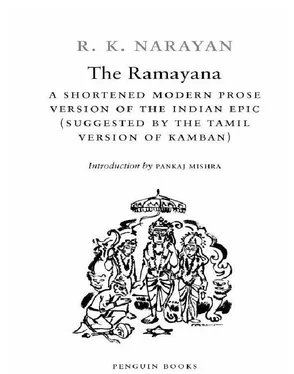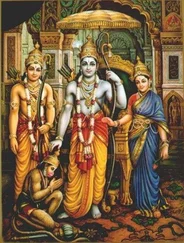Махариши Вальмики - The Ramayana
Здесь есть возможность читать онлайн «Махариши Вальмики - The Ramayana» весь текст электронной книги совершенно бесплатно (целиком полную версию без сокращений). В некоторых случаях можно слушать аудио, скачать через торрент в формате fb2 и присутствует краткое содержание. Жанр: Старинная литература, на английском языке. Описание произведения, (предисловие) а так же отзывы посетителей доступны на портале библиотеки ЛибКат.
- Название:The Ramayana
- Автор:
- Жанр:
- Год:неизвестен
- ISBN:нет данных
- Рейтинг книги:3 / 5. Голосов: 1
-
Избранное:Добавить в избранное
- Отзывы:
-
Ваша оценка:
- 60
- 1
- 2
- 3
- 4
- 5
The Ramayana: краткое содержание, описание и аннотация
Предлагаем к чтению аннотацию, описание, краткое содержание или предисловие (зависит от того, что написал сам автор книги «The Ramayana»). Если вы не нашли необходимую информацию о книге — напишите в комментариях, мы постараемся отыскать её.
The Ramayana — читать онлайн бесплатно полную книгу (весь текст) целиком
Ниже представлен текст книги, разбитый по страницам. Система сохранения места последней прочитанной страницы, позволяет с удобством читать онлайн бесплатно книгу «The Ramayana», без необходимости каждый раз заново искать на чём Вы остановились. Поставьте закладку, и сможете в любой момент перейти на страницу, на которой закончили чтение.
Интервал:
Закладка:
Vasishtha said, “The Queen, Kaikeyi, is most considerate. She will do nothing that goes against your wishes. I am sure she will be obliging and helpful. There has been no opportunity to discuss these questions with her Majesty, our immediate concern being your welfare.” Kaikeyi listened passively to this hopeful statement by Vasishtha.
Dasaratha, clutching at a straw of hope, asked, “Does she relent? If she does, Rama will be King; and as to my promise, let her ask for any other fulfillment she may think of. . . .”
Relieved to find the King improving, Vasishtha turned to Kaikeyi and appealed to her with all the humility he could muster in his tone. “Everything is in your hands. . . . Please consider yourself as the benefactress of humanity. The whole world will be grateful to you for your help. Please reconsider.”
Kaikeyi became emotional: “If one cannot depend on the promise of a famous king,” she hissed, “life is not worth living. After all, I have done nothing more than ask for the fulfillment of his own voluntary promise, and you talk as if I had committed a crime!”
“You do not realize the evil consequences of your act, nor are you willing to listen and understand when we try to explain. Your obstinacy is inhuman,” said Vasishtha. When she appeared unaffected, he went on: “The King’s tongue never uttered the words of exile; you have passed this on as his own command, knowing that Rama would never question the truth of it. You have used your position as his favourite queen.”
No matter how he argued and persuaded, Kaikeyi held her ground with cynical calm. “Oh, Guruji, you too talk like these ignorant, self-centered people who find fault with me without understanding.”
Finally the King burst out, “Oh, devilish one, you ordered him into exile! Is he gone? In seeking you as a mate, I sought my death. Those cherry-red lips I thought sustained me, but they have only been a source of the deadliest poison to finish me off now. This sage be my witness. You are no longer my wife, and your son shall not be entitled to cremate me when I die.”
Kausalya, when she saw her husband’s plight, was most moved and tried to comfort him in her own way. Concealing her own misery at the prospect of Rama’s exile, she told her husband clearly, “If you do not maintain the integrity and truth of your own words, and now try to hold Rama back, the world will not accept it. Try to lessen your attachment to Rama and calm yourself.”
The King was not appeased by her advice. “The holy water from Ganga brought for ablution during the coronation will now serve me for my last drink; the holy fire raised will serve to light my funeral pyre. Rama, Rama, don’t go. I take back my word to Kaikeyi. . . . How can I bear to see you go? I will not survive your departure. If I lived after your departure, what would be the difference between me and that monster in wife’s shape—Kaikeyi?” Thus and in many other ways, Dasaratha lamented.
Vasishtha said, “Do not grieve. . . . I will see that your son is persuaded to stay back.” Dasaratha had become so weakened in will that he clung to this hope when he saw the sage depart. Kausalya comforted the King by saying, “It is quite likely Vasishtha will come back with Rama.” She tenderly lifted him, nursed him, and stroked his head and shoulder. He kept repeating, “Will Rama come? When? How terrible that Kaikeyi, whom I loved so much, should contrive my death so that she may place Bharatha on the throne!” Silence for a while, but once again all his lamentations and fears would return redoubled.
“Kausalya, my dearest wife, listen. Rama will not change his aim, but definitely go away, and my life will end. You know why? It’s an old story.
“Once while I was hunting in a forest, I heard the gurgling of water—the noise an elephant makes when drinking water. I shot an arrow in that direction, and at once heard a human cry in agony. I went up and found that I had shot at a young boy. He had been filling his pitcher; and water rushing into it had created the noise. The boy was dying and told me that his old parents, eyeless, were not far away. He had tended them, carrying them about on his back. They died on hearing of this tragedy, after cursing the man who had killed their son to suffer a similar fate. And so that is going to be my fate. . . .”
When Rama’s exile became known, the kings and commoners assembled at the hall broke down and wept; so did the religious heads and ascetics. Men and women wept aloud; the parrots in their cages wept, the cats in people’s homes; the infants in their cradles, the cows and calves. Flowers that had just bloomed wilted away. The water birds, the elephants, the chargers that drew chariots—all broke down and lamented like Dasaratha himself, unable to bear the pang of separation from Rama. What a moment ago had been a world of festivities had become one of mourning. Crowds thronged hither and thither, stood in knots at street corners, watched the portals of the palace, speculating and commenting. “Kaikeyi—the red-lipped prostitute,” they said. “We never suspected that our King was so lost in infatuation. . . . We thought that the red-lipped woman was our Queen, but she has shown her true nature—using her flesh to bait a senile male, who has sought his own ruin and thereby the ruin of our country. Let Kaikeyi try and rule this country with her son—there will be none left to rule over; we will all kill ourselves or move out with Rama. Ah, unfortunate earth not destined to have Rama as your overlord! What is Lakshmana doing? How will he stand this separation? What justification can there be for breaking a promise made to Rama? Strange act of justice this! The world has suddenly gone mad!”
Lakshmana, on hearing of the developments, was roused like the fire starting to consume the earth on the last day. “Food kept for the lion is sought to be fed to the street puppy—so plans that doe-eyed Kaikeyi,” commented Lakshmana. He picked up his sword and bow, put on his battle dress, and aggressively roamed the streets swearing, “Rama shall be crowned, and whoever comes in the way will be annihilated. Let the whole world come, I’ll destroy everyone who opposes, and pile up their carcasses sky high. I’ll seize the crown and will not rest till I place it on Rama’s head. This I’ll achieve this very day, this very day.” Seeing his fiery eyes and hearing his stentorian challenges, people withdrew from his proximity. “If all the gods in heaven, all the demons, all the good people of the earth, and bad—if the whole world oppose me, I’ll not relent or yield to the desire of a mere female. . . .”
His challenges and the rattling of his arms and the twanging of his bow-string reached the ears of Rama, who was just on his way to take leave of his stepmother Sumithra, Lakshmana’s mother, and he immediately turned back and confronted Lakshmana. “What makes you wear all this battle-dress, and against whom are you uttering your challenges? And why are you so wild and angry?”
Lakshmana said, “If this is not the occasion for anger, when else is it? After having promised you your rightful place—to deny it now! I can’t tolerate it. The vicious dreams of that black-hearted woman shall not be fulfilled. I’ll not let my senses watch this injustice passively. I’ll resist it till I perish.”
“It was my mistake,” said Rama. “I have only myself to blame for accepting my father’s offer of the throne so readily without thinking of the consequences. Your tongue, learned in the recital of Vedas and all the truths of godly life, should not be allowed to utter whatever it likes so irresponsibly. Your charges will not stand the scrutiny of judicious and serene temperaments. You must not utter such bitter remarks about people who after all are none other than your father and mother.” (Rama makes no distinction between mother and stepmother). “Calm yourself. Sometimes a river runs dry, and then it cannot be said to be the fault of the river—it’s dry because the heavens are dry. So also, our father’s change of mind, or the apparent hardheartedness of Kaikeyi, who has been so loving and kind, or Bharatha’s chance of succession. . . . These are really not our own doing, but some higher powers have decreed them. Fate . . .”
Читать дальшеИнтервал:
Закладка:
Похожие книги на «The Ramayana»
Представляем Вашему вниманию похожие книги на «The Ramayana» списком для выбора. Мы отобрали схожую по названию и смыслу литературу в надежде предоставить читателям больше вариантов отыскать новые, интересные, ещё непрочитанные произведения.
Обсуждение, отзывы о книге «The Ramayana» и просто собственные мнения читателей. Оставьте ваши комментарии, напишите, что Вы думаете о произведении, его смысле или главных героях. Укажите что конкретно понравилось, а что нет, и почему Вы так считаете.












